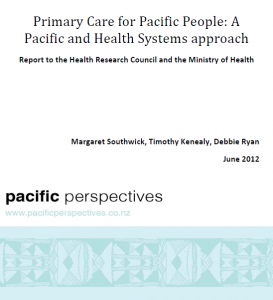
M Southwick, T Kenealy, D Ryan
“Pacific peoples have poorer health status across a wide variety of measures compared to the total New Zealand population. They also appear to have the least advantage from changes to the delivery in primary care. This report presents evidence to support improvements in primary care delivery to Pacific peoples.
The Pacific population is experiencing unmet health needs and variations in the qualtiy of health care. The three major barriers for Pacific are cost, transport and language. Other barriers include family commitments, difficulty in meeting appointment times, difficulty in understanding the nature and necessity of an appointment, lack of access to after hour services, communication barriers, inflexible employment, and feeling cultural discomfort when discussing health issues with non-Pacific practioners. Additionally, structural problems include long waiting times, lack of discussion time with doctor, crowded clinics, and the bringing and minding of children.
Providers’ concerns are centred on practical issues of appointment systems, contacting people and payments. Some providers have put in place strategies to balance the needs of appointment and walk in patients; multiple contacting methods such as reminder phone calls and text messages; and setting up automatic payements or accepting non-payments or writing off bills.
Improving Pacific engagement in primary care is reliant on both primary care to create an environment and deliver services that is culturally safe and employs strategies that increase Pacific access to and utilisation of primary health care, while at the same time Pacific people taking control of their health and doing the best they can under varying circumstances.”
Find the report here
